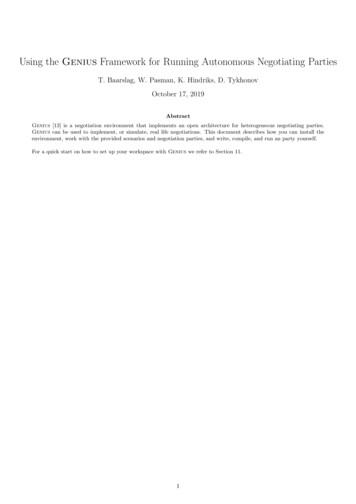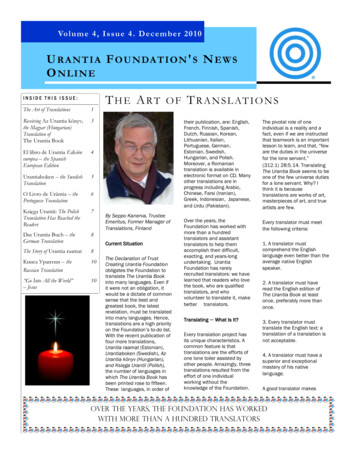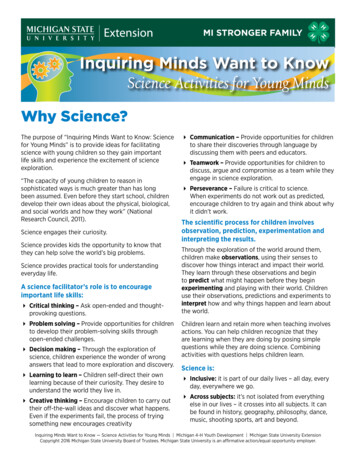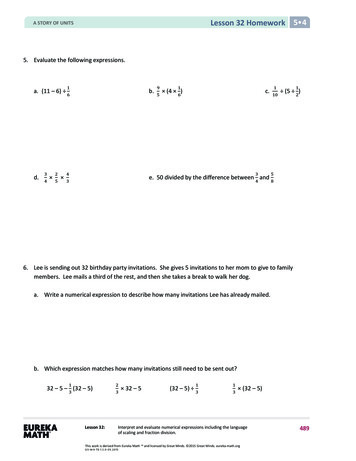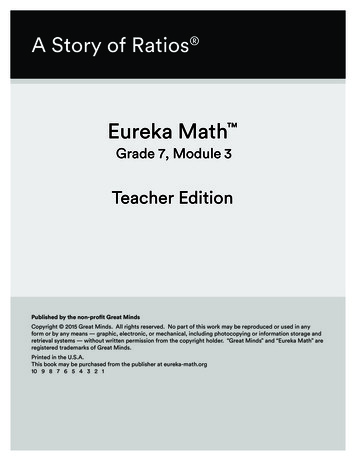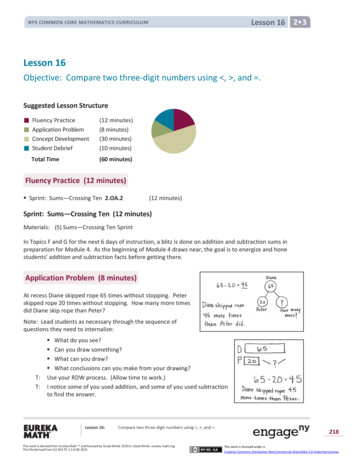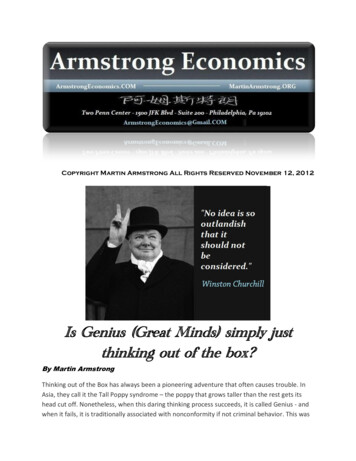
Transcription
Copyright Martin Armstrong All Rights Reserved November 12, 2012Is Genius (Great Minds) simply justthinking out of the box?By Martin ArmstrongThinking out of the Box has always been a pioneering adventure that often causes trouble. InAsia, they call it the Tall Poppy syndrome – the poppy that grows taller than the rest gets itshead cut off. Nonetheless, when this daring thinking process succeeds, it is called Genius - andwhen it fails, it is traditionally associated with nonconformity if not criminal behavior. This was
the price paid by the Scottish economic philosopher John Law (1671–1729) who was really thefather of Supply & Demand concepts who has been plagiarized by everyone because he wasaccused of fraud. Law’s “fraud” was of course not for personal gain, but for the expansion ofmoney and its reality – a reflection of the medium of exchange based upon the productiveforces of a nation. What Law envisioned is what we have today where money is reallyindistinguishable from a share in a corporation. Money rises and falls in value as do shares in acompany based solely upon the confidence in a nation. This may be reality, yet the concept stilleludes even modern thinking.Nevertheless, we are at a crossroads where knowledge is about to be put to the Test of Ageswhere either we remain in darkness presuming the world is flat or open our mind to a wholenew world. Winston Churchill was a nonconformist who was rather independent and rebelliousby nature. Yet it was Churchill’s natural talents that made him a world leader despite his lack ofa formal education degree. He was truly anonconformist who thought out of the box andreshaped the world even after being put into politicalexile.Winston SpencerChurchillThe Last Lion is a planned trilogy of biographies coveringthe life of Winston Churchill (1874-1965). Two havealready been published, by author and historian WilliamManchester. The last volume is being completed by Paul Reid. What people presume abouteducation is somehow it prepares one for life and what they do. However, you cannot get adegree in hedging, funds management, or technical and cyclical analysis. Such knowledge onlycomes from experience with training as an apprentice in the real world - not in university.Winston Churchill was a drop-out from school as was Bill Gates. Churchill was independent andrebellious by nature. He generally had a poor academic record in school, for which he was
regularly even punished. He was educated at three independent schools: St. George's School,Ascot, Berkshire; Brunswick School in Hove, near Brighton (the school has since been renamedStoke Brunswick School and relocated to Ashurst Wood in West Sussex); and at Harrow Schoolfrom April 17, 1888.Churchill was rarely visited by his mother, and wrote letters begging her either to come to theschool or to allow him to come home. His relationship with his father was distant; he onceremarked that they barely spoke to one another. His father died on January 24, 1895, aged 45,leaving Churchill with the conviction that he too would die young and so should be quick aboutmaking his mark on the world. He left school for the military where he sought to distinguishhimself by his deeds. Yet it was this independent streak that led him to be considered a puregenius. William Manchester wrote in volume I of the Last Lion:“Clearly there was something odd here. Winston, Davidson had conceded, was theablest boy in his form. He was, in fact, remarkable. His grasp of history wasoutstanding. Yet he was considered a hopeless pupil. It occurred to no one that thefault might lie, not in the boy, but in the school. Samuel Butler defined genius as "asupreme capacity for getting its possessors into trouble of all kinds," and it isironic that geniuses are likeliest to bemisunderstood in classrooms. Studies at theUniversity of Chicago and the University ofMinnesota have found that teachers smile onchildren with high IQs and frown upon those withcreative minds. Intelligent but uncreativestudents accept conformity, never rebel, andcomplete their assignments with dispatch and toperfection. The creative child, on the other hand,is manipulative, imaginative, and intuitive. He islikely to harass the teacher. He is regarded aswild, naughty, silly, undependable, lacking inseriousness or even promise. His behavior is distracting; he doesn't seem to be trying; he givesunique answers to banal questions, touching offlaughter among the other children. E. Paul Torrance of Minnesota found that 70 percent ofpupils rated high in creativity were rejected byteachers picking a special class for theintellectually gifted. The Goertzels concluded thata Stanford study of genius, under which teachers selected bright children, wouldhave excluded Churchill, Edison, Picasso, and Mark Twain.None of this was known to Welldon and his staff, but as term succeeded term anawareness grew among them that Winston was a baffling boy. He couldn't, orwouldn't, learn the ablative absolute - a minor feat of memory - but he could recitetwelve hundred lines of Macaulay.” (id/pages 158-159)
This is where we are at today. We are in such acrisis and void of experience where it counts, thedark clouds have gathered obscuring our path tothe future. This is a time when thinking out of thebox is once again our only survival alternative.They say that heaven send us men of substancein our time of need. This was certainly true of theEnlightenment that produced the advance inknowledge from world being flat to roundculminating in the American and FrenchRevolutions that reshaped the dominategovernmental structure ruled by Monarchy. Theyburned alive Giordano Bruno (1548–1600) for hisaudacity to assume the earth was not the centerof the universe.It is abundantly clear that the fall ofConstantinople had led to a flood of old worldknowledge that poured into Western Europe. The ancients did not believe the earth was flat,but was a sphere. Aristotle (384-322BC) believed that the earth was the center of the planetsand everything revolved around it including the sun. There were maps that gave the shape ofthe earth drawn by Ptolemy, the 2nd Century AD Alexandrian astronomer whose workmiscalculated the diameter, yet his maps were used by Christopher Columbus (1451-1506). Forthis reason, when Columbus died, he still believed he had only reached India based uponPtolemy's charts. It would be Amerigo Vespucci (1454-1512) who determined the earth wasbigger that Ptolemy calculated and thus it was a new continent Columbus discovered and notIndia. For this reason, this discovery wasnamed in his honor, America.The fall of Constantinople in 1453 sent ashockwave that profoundly changed the world.Not only did the Financial Capital of the Worldmove to India, but a giant tidal wave ofknowledge was set in motion that engulfed theshores of Western Europe rekindling the firesthat stimulated an explosion of knowledge thathad long been forgotten through the Dark Agesafter the fall of Rome in 476AD.
Trying to ascertain HOW the world functioned is a lost science whose time has arrived onceagain. It was the spark that ignited the Age of Enlightenment. Eleanor Roosevelt (1884-1962)said “Great Minds discuss ideas; average minds discuss events; small minds discuss people.”Indeed, let a financial crisis hit and the small minds of government seek to attribute the eventto some person to prosecute. They are incapable of even contemplating “ideas” and at bestmerely put on a show and pretend to understand an event. They inhibit the advancement ofknowledge for that threatens their very existence.Nevertheless, this early flood of knowledge from the Ancient World sparked not only sparkedthe courage of Columbus to believe the world was round and not flat, but also NicolausCopernicus (1473-1543) who challenged the Aristotlian view that the earth was at the center ofthe planets. These ideas challenged the authority of church and states that remained consumedin their ignorance and self-interest of maintaining the status quo not unlike the folly we watchin political elections currently. Copernicus’ ideas influenced Bruno who was burned alive at thestake for agreeing with him and Gallileo Galilei (1564-1642), after seeing the horror of beingburned alive gagged to muffle the screams, chose to plead guilty and died under lifeimprisonment for his beliefs that the sun was at the center of the planets also agreeing withCopernicus. Small minds have always murdered great minds for in their words lies the seeds totheir own demise.
Consequently, it was the rediscovery of the ancient knowledge that the earth was round thatinspired Columbus to set sail for India and created a whole New Age of science untethered fromthe small minds of church and state. We are embarking upon a whole New Age ofunderstanding. A New Age of Enlightenment where knowledge will suddenly advance, but onlythrough the forces of Creative Destruction as Joseph Schumpeter proposed. The SovereignDebt Crisis is about to humble the greatest of nations, wiping out the savings of many, andredefine the future as never before. Pension funds will be wiped out and the rule of law willcollapse entirely. This is the danger we face as long as governments are in the hands of narrowminded people with self-interest.Marx’s idea of eliminating the Business Cycle has led to the death of countless millions. This lastUS political election saw such hatred fueling class warfare that was all set in motion by Marx.We stand on the threshold of a New Age where the ideas of Marx are destroying societyprecisely in violation of even the Ten Commandments which forbids:“‘And you shall not covet your neighbor's wife. And you shall not desire your neighbor'shouse, his field, or his male servant, or his female servant, his ox, or his donkey, or anythingthat is your neighbor's.”Marxism and its current “socialism” thatdominates the West even violates the laws ofGod. This idea of taking someone else’sproperty because it is not “fair” that theyhave more than someone else is the conceptof how a thief justifies his actions – “they canafford it.” Marxism was an idea whose timearrived as Victor Hugo (1802-1885) put it. Anew idea is now on the horizon. It is as PaulVolcker stated in 1979 – the Rediscovery ofthe Business Cycle.Genius is not like being rich where people define “rich” as everyone who has more than them.Genius is nonconformity and willing to consider all ideas thinking out of the box. We areembarking on a New Age. This can be both exciting and highly dangerous. Its time is here! Itsforce will be felt upon the nations of the world. The Business Cycle is alive and well. It can nomore be tempered and controlled than weather. The careless actions of government, which aredominated by small minds, have led us to the brink of major economic upheaval. Small mindswill focus only on people. Average minds upon the event. But the Great Minds, those who thinkout of the box and connect all the dots, will see the path that lies ahead. Embrace the journey.For we have no choice. The current systems are unsustainable.
Trying to ascertain HOW the world functioned is a lost science whose time has arrived once again. It was the spark that ignited the Age of Enlightenment. Eleanor Roosevelt (1884-1962) said "Great Minds discuss ideas; average minds discuss events; small minds discuss people."
